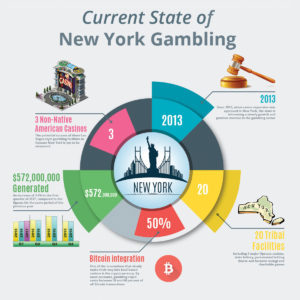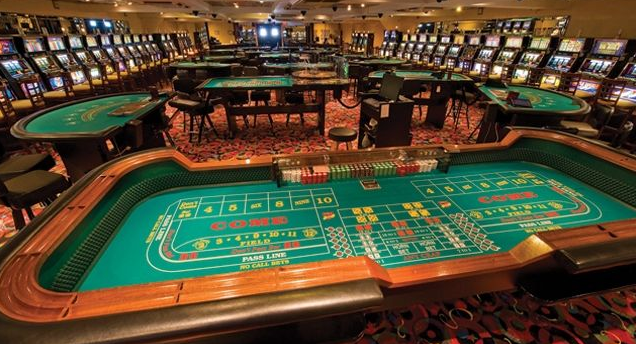LISTEN TO TLR’S LATEST PODCAST:
By Evan Reid

While gambling may be legally restricted in most of the United States, some states are starting to tolerate it, at least in some of its forms. Since 2013, when casino expansion was approved in New York, the state is witnessing a steady growth and positive revenue in the gambling sector. This is the fourth most populous state in the country, home to New York City, one of the largest urban areas in the world, and its millions of citizens already have a relatively easy access to plenty of gaming options – the increasingly popular New York Lottery, various Native American casinos, charitable gambling venues, and others.
Legal Landscape
Overall, the gambling industry in the country is regulated at the state level and in New York, there are several legal gaming options – 20 tribal facilities, including 5 major Upstate casinos, state lottery, pari-mutuel betting (horse and harness racing), and charitable games, which are regulated, but allowed. Native American gambling venues across New York offer the largest variety of games and betting options, as they are located in sovereign areas where the state has limited jurisdiction. These include bingo halls, large casino resorts, as well as the so-called “racinos”, facilities where horse racing is paired with electronic game machines.
For more than a hundred years, gambling laws in New York have been extremely restrictive, but in recent years, the state is slowly moving towards lifting some of the bans. In 2013, voters in New York approved an amendment to the state constitution which allowed the introduction of up to 7 Vegas-style casinos that would not be run by Indian tribes. Currently, there are two types of casinos in New York – traditional casinos, offering Class III gambling, as well as Class II gambling venues where you can play electronic bingo machines. While Class I and II gambling operations (bingo and poker halls, lotteries) do not require a license, Class III gaming facilities need a license, as they offer high-stake games. These facilities are often racetracks or casinos where customers can place bets on classic table games – roulette, blackjack, craps, poker (Classic, Caribbean Stud, Pai Gow, Three Card), keno, and baccarat.
Since 2013, commercial casinos are also allowed – they are owned by private gambling operators and are not located on Native American land. Online gambling, on the other hand, is limited to online horse betting, which is the only form of web-based gaming that is allowed. New Yorkers can still gamble online, as long as they stick to offshore websites. Operating a gambling site is illegal, if you are based in New York, but this may soon change. In June 2017, the New York Senate passed a bill which would legalize and regulate online poker, unless the Assembly does not vote against it.
Market Saturation
New York is just one of several states that approved gambling legislation in recent years. The loosing of restrictions brings new casinos and new gambling operators into the market. In the north-eastern United States, there are numerous casinos, race tracks, bingo halls, and other gambling venues which are already meeting and exceeding the demand. There is, apparently, a saturation of the market across the whole region – expansion of the industry means more gambling facilities, but does not necessarily mean more revenue.
According to official statistics, the market in New Jersey, Delaware, Pennsylvania, West Virginia and Maryland was down in 2013-2014, seeing decreasing revenues. Between 2014 and 2016, five out of twelve gambling venues closed doors in Atlantic City, which was once the only place to offer gambling in the East. However, after years of decline, Atlantic City is starting to recover – in the first quarter of 2017, casinos generated $572 million, an increase of 3.56% compared to the figures for the same period of the previous year. Still, competition from other states and New York, in particular, may cause even more closures in the following years.
Speaking of New York, the first commercial Non-Native American casino opened doors in December 2016 and another two followed in the next months. The potential success of these Las Vegas-style gambling facilities in Upstate New York is yet to be measured, but according to the numbers from the New York State Gaming Commission, weekly revenues are rising. As reported by CasinoGamesPro, more casinos are expected to launch in the near future, leading to a huge concentration of venues in New York. Many experts predict that there will be a point of saturation in the market and such overcrowding may harm the traditional tribal gaming facilities and racinos. Others believe that older venues will manage to survive, despite the arrival of modern, more diverse gambling operations, especially if certain improvements in the industry take place.
Innovations
Just like across the entire United States, land-based casinos in New York are seeing huge competition from gambling websites. Online and mobile gaming is incredibly popular among the younger generations, despite being illegal in the state – players have a large number of offshore web-based casinos to choose from. Online gambling operators report sustainable revenue growth, as opposed to brick-and-mortar casinos, some of which are struggling to meet the expectations of millennials.
However, some gambling operators are joining the new generation of casinos, which combine the traditional gaming experience with a more diverse kind of entertainment. Following the state’s constitution amendment in 2013, the racino Tioga Downs in Nichols, New York received a gaming license and opened its new casino in December, 2016. The facility will soon become a real casino resort and entertainment complex when the planned 160-room hotel opens in 2017. Along with the new gaming floor hosting table games and slot machines, the new Tioga Downs will feature a golf course, several restaurants and night clubs.
Another casino which went through a total remodelling is Foxwoods Resort Casino in Connecticut. Orienting itself towards a younger audience, the operator replaced some of the game tables with more diverse entertainment options such as retail stores, bars, and even a a place where you can get a tattoo. The resort also has a concert theater, a golf course, a spa facility, and a bowling alley.
In order to stay up-to-date, New York gambling facilities need to diversify the services they offer – opting for more entertainment in favor of old-school gambling is a great step to modernizing, but it is hardly a sufficient one. One of the innovations that slowly make their way into land-based casinos is the cryptocurrency. Bitcoin, in particular, is already an established method for making payments in online casinos. And while many users turn to it because of the anonymity it offers, the cryptocurrency has even more benefits, namely flexibility, security, and no transaction fees.
The Future of Gambling in New York
The gambling industry in New York, land-based and online, probably will not explode in the near future, as the expected liberalization of the legislation is rather slow. After the constitution’s amendment of 2013, it took three years for the first commercial casino to open in the state. The future of online poker is still uncertain, as the push for legalizing it has already failed in the past. Another threat for a future booming gambling industry is the market saturation – although it still does not put a huge pressure on operators in New York, it may lead to the decline and even closure of some of the older gambling facilities which could not keep up with the new trends.
However, the market is experiencing a steady growth, as well as positive revenue. Compared to New Jersey, where the gambling industry has almost come to a standstill in the past few decades due to the rise of Native American casinos, New York is witnessing growth, as well as a rise in demand. New York City has a high standard of living and a flourishing economy that depends on multiple sectors, as opposed to Las Vegas or Atlantic City where, until recently, gambling was considered the largest driver of economic growth. This is certainly a good business environment that would be beneficial for any industry, including gambling.





3 comments
… [Trackback]
[…] Read More on that Topic: thelibertarianrepublic.com/current-state-new-york-gambling/ […]
… [Trackback]
[…] Read More on that Topic: thelibertarianrepublic.com/current-state-new-york-gambling/ […]
… [Trackback]
[…] Find More on that Topic: thelibertarianrepublic.com/current-state-new-york-gambling/ […]